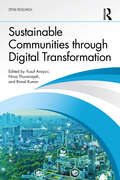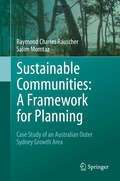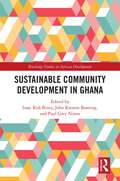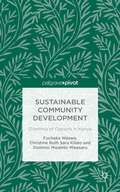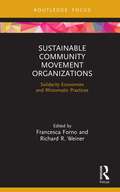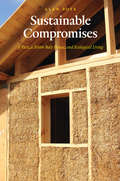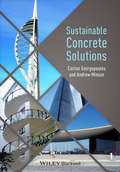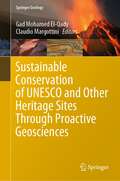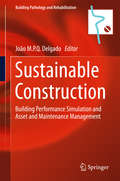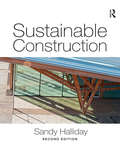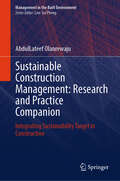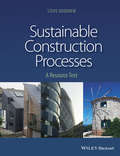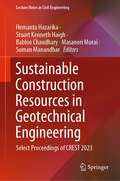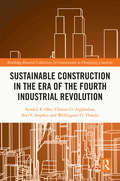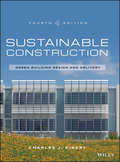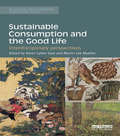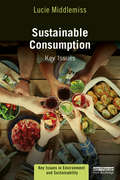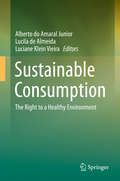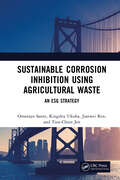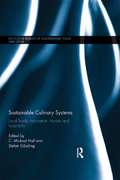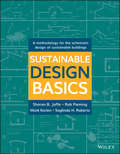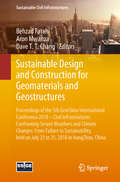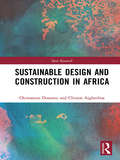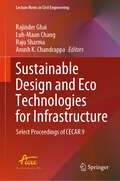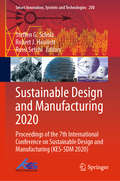- Table View
- List View
Sustainable Communities through Digital Transformation (Spon Research)
by Yusuf Arayici Niraj Thurairajah Bimal KumarThis book brings together cutting-edge exploratory research findings to show how a vision for sustainable communities can be enabled by digital transformation. It attempts to apply existing knowledge about digital transformation and sustainable communities and compare, interpret, diagnose, and evaluate a variety of digital solutions to ascertain their suitability for the delivery of a more sustainable built environment. Chapters examine a breadth of issues including how digital transformations could: Provide digital/physical working/living environments that anticipate emerging lifestyles Blend digital engagements into the physical engagements within the built environment Support business and social activity in physical and online venues Use advanced information and community-oriented technologies for efficient management of urban services Promote sustainability Express narratives that celebrate the experience of place and community Leverage transformation of educational systems Foster linkages between universities, and between universities and businesses Facilitate working relationships among small and large companies Foster new processes and arrangements for innovation in the built environment By comparing the key principles of digital transformation with those of sustainable communities, the contributors seek to justify or discount the applicability of digital change for achieving more sustainable communities. The research presented in this book is essential reading for architecture, urban planning, quantity surveying, building surveying, real estate, and construction management professionals and academics.
Sustainable Communities: A Framework for Planning
by Raymond Charles Rauscher Salim MomtazThis book is in part a response to the attempts of governments to address increasing concerns over such environmental issues as the impact of climate change; carbon emissions; pressures from overpopulation of cities; coal seam gas extraction and depleting natural resources. The authors have developed a Sustainable Communities Framework (SCF) which incorporates social-cultural, environmental and economic sustainability principles in the process of urban planning. The authors propose a five-step SCF built on an application of sustainability tables. The book examines a wide range of urban planning practices utilizing sustainability criteria, outlining both qualitative and quantitative tools. Separate chapters discuss application of the SCF to both the natural environment and the built environment. This framework is applied to a case study of the outer Sydney growth area of Wyong Shire, Central Coast, NSW, Australia. Addressing the question of how best to measure the environment, the authors present a table for selecting indicators of sustainability, and outline sustainability scorecards which use color-coded ratings of green, red and amber to measure indicators of sustainability. The authors show how aggregating these ratings allows the framework to be scaled up for application to larger areas. Finally, the authors show how scorecards can be incorporated in sustainability reports, with actions and monitoring components. The authors also examine urban planning education including land use planning, natural resource planning and sustainable urban planning, focusing on the extent to which schools incorporate principles of sustainability. The authors offer their critique on the movement of planning practices towards a more coordinated and holistic framework, in incorporating sustainability principles. Sustainable Communities: A Framework for Planning concludes by drawing a future scenario on the application of the SCF to incorporate principles of sustainability into urban planning. The authors propose future options for SCF applications, including adopting a systems program; environmental performance monitoring and showing how the framework will accommodate the social-cultural and economic components of sustainability, in addition to the environmental ones as examined in the case study.
Sustainable Community Development in Ghana (Routledge Studies in African Development)
by John Kwame Boateng Isaac Kofi Biney Paul Gary NixonThis book explores sustainable community development in Ghana post-COVID-19, highlighting examples of how individuals facing extreme challenges have adapted to their changing circumstances.Through the voices of African researchers, it explores the different responses that local, subnational, and national stakeholders and communities initiated to preserve the gains made in achieving the Sustainable Development Goals in Ghana during the global pandemic. This collection considers how policy makers are tackling the pressing issues of sustainability, climate change and its effects on Africa and Ghana in particular, and multi-stakeholder policy responses to building communities in a post-COVID-19 world. The case studies show how communities are interacting to ensure sustainable community development and learning in the Global South, and the role that education and learning, both formal and informal, play in strengthening livelihoods, choices, and opportunities in African communities.An assessment of multi-stakeholder policy responses to building communities in Ghana, this book will be of interest to scholars and students in the field of Education, Education Management, Sociology, Economics, and African Studies. It will also be of interest to policy makers and practitioners engaged in community development programmes and activities and the development of associated policies.
Sustainable Community Development: Dilemma of Options in Kenya
by Fuchaka Waswa Christine Ruth Saru Kilalo Dominic Mwambi MwasaruCommunity development has lately gained much prominence, but the emphasis has remained on the economic and social welfare of communities, rather than the environment. By focusing on 'sustainable' development in Kenya, this study shows the importance of integrating ecological concerns in socio-economic and cultural development processes.
Sustainable Community Movement Organizations: Solidarity Economies and Rhizomatic Practices (Routledge Focus on Environment and Sustainability)
by Francesca Forno Richard R. WeinerThis volume shines a light on Sustainable Community Movement Organizations (SCMOs), an emergent wave of non-hierarchical, community-based socio-economic movements, with alternative forms of consumption and production very much at their core. Extending beyond traditional ideas of cooperatives and mutualities, the essays in this collection explore new geographies of solidarity practices ranging from forms of horizontal democracy to interurban and transnational networks. The authors uniquely frame these movements within the Deleuzian concept of the ‘rhizome’, as a meshwork of alternative spaces, paths and trajectories. This connectivity is illustrated in case studies from around the world, ranging from protest movements in response to austerity measures in Southern Europe, to the Buen Vivir movement in the Andes, and Rotating Savings and Credit Associations (ROSCAs) in the Caribbean and Canada. Positioning these cases in relation to current theoretical debates on Social Solidarity Economy, the authors specifically address the question of the persistence and the durability of the organizing practices in community economies. This book will be a valuable tool for academics and students of sustainable consumption, environmental policy, social policy, environmental economics, environmental management and sustainability studies more broadly.
Sustainable Compromises: A Yurt, a Straw Bale House, and Ecological Living (Our Sustainable Future)
by Alan BoyeLiving simply isn’t always simple. When Alan Boye first lived in sustainable housing, he was young, idealistic, and not much susceptible to compromise—until rattlesnakes, black widow spiders, and loneliness drove him out of the utilities-free yurt he’d built in New Mexico. Thirty-five years later, he decided to try again. This time, with an idealism tempered by experience and practical considerations, Boye and his wife constructed an off-the-grid, energy-efficient, straw bale house in Vermont. Sustainable Compromises chronicles these two remarkable attempts to live simply in two disparate American eras. Writing with hard-won authority and humor, Boye takes up the “how-to” practicalities of “building green,” from finances to nuts and bolts to strains on friends and family. With Walden as a historical and philosophical touchstone and his own experience as a practical guide, he also explores the ethical and environmental concerns that have framed such undertakings from Thoreau’s day to our own. A firsthand account of the pleasures and pitfalls of living simply, his book is a deeply informed and engaging reflection on what sustainability really means—in personal, communal, ethical, and environmental terms.
Sustainable Concrete Solutions
by Andrew Minson Costas GeorgopoulosThe challenges facing humanity in the 21st century include climate change, population growth, overconsumption of resources, overproduction of waste and increasing energy demands. For construction practitioners, responding to these challenges means creating a built environment that provides accommodation and infrastructure with better whole-life performance using lower volumes of primary materials, less non-renewable energy, wasting less and causing fewer disturbances to the natural environment. Concrete is ubiquitous in the built environment. It is therefore essential that it is used in the most sustainable way so practitioners must become aware of the range of sustainable concrete solutions available for construction. While sustainable development has been embedded into engineering curricula, it can be difficult for students and academics to be fully aware of the innovations in sustainable construction that are developed by the industry. Sustainable Concrete Solutions serves as an introduction to and an overview of the latest developments in sustainable concrete construction. It provides useful guidance, with further references, to students, researchers, academics and practitioners of all construction disciplines who are faced with the challenge of designing, specifying and constructing with concrete.
Sustainable Conservation of UNESCO and Other Heritage Sites Through Proactive Geosciences (Springer Geology)
by Claudio Margottini Gad Mohamed El-QadyThis book presents up-to-date geoscience technologies for heritage investigations and conservation, covering various sub-disciplines of geophysics, geodesy, 3D laser scanning technology, hydrogeology, and rock mechanics applied to the exploration of new heritage sites, mapping and visualization, as well as hazard mitigation. The current shift toward interdisciplinary ways of thinking highlights the added value of merging arts with sciences and other disciplines for better management and preservation of cultural heritage. Featuring advanced scientific investigations in 40 case studies around the globe, the book demonstrates how a better understanding of natural processes coupled with conservation approaches, mainly based on sustainable practices such as the use of traditional knowledge in recovery techniques and building local capacities, can ensure effective conservation.
Sustainable Construction
by João M. P. Q. DelgadoThis book presents acollection of recent research works that highlight best practice solutions,case studies and practical advice on the implementation of sustainableconstruction techniques. It includes a set of new developments in the field ofbuilding performance simulation, building sustainability assessment,sustainable management, asset and maintenance management and service-life prediction. Accordingly, the book will appeal to a broad readership of professionals,scientists, students, practitioners, lecturers and other interested parties.
Sustainable Construction
by Sandy HallidayThe second edition of Sustainable Construction provides a masterclass on the principles and techniques involved in the design and delivery of practical, affordable, high quality sustainable buildings and places. It presents precedents, theory, concepts and principles alongside 120 wide ranging case studies that highlight current best practice and encourage implementation. Topics in the book include: • the history of ideas in sustainable construction • policy • materials • cost issues • appraisal techniques • environmental design • energy • water • construction processes • and urban ecology. The book is heavily illustrated in full colour and is an ideal, contemporary, accessible primer to courses in Architecture, Construction, Building Engineering, Environmental Engineering, Project Management, Landscape, Urbanism and Development.
Sustainable Construction Management: Integrating Sustainability Target in Construction (Management in the Built Environment)
by AbdulLateef OlanrewajuThis book provides a centralized source of information on specific sustainable construction management strategies, practices, and principles. It compiles pertinent information on sustainable construction management into a single, easily accessible document together with guidelines, procedures, and best practices. Without having to examine several sources, users may easily access the information they require for sustainable construction management. This book blatantly seeks to standardize procedures, enable onboarding and training, guarantee compliance, offer reference and troubleshooting assistance, encourage openness and communication, and promote ongoing process and organizational improvement. The book contains practical insights and trends drawing from empirical conclusions that are derived from data collected from experts and practitioners in the construction sector. Potential readers could include instructors at tertiary institutions, students (both research, graduate, and undergraduate students) as well as policy-makers from the relevant authorities who seek to better understand sustainability in the built environment.
Sustainable Construction Processes: A Resource Text
by Steve GoodhewThis book explores the concepts and practicalities that lead to sustainable construction. It breaks new ground by providing the reader with the underlying principles of how to build sustainably and then assesses many of the tools required for the task. From energy to materials and from procurement to operation, all aspects play their part in turning a theoretically sustainable building project into a reality. There are many guidelines for the designer on how to maximise the sustainability of buildings but this resource text supplements these by focusing on the construction and operational aspects of sustainable buildings, as well as some of the more fundamental design-related considerations. ? Offers an excellent text for those learning to construct, design and operate sustainable buildings. ? Covers the drivers for sustainable construction, definitions, historical impacts, climate change and global, regional and individual responses. ? enables the construction professional to achieve optimum solutions, both in design, process and the aftercare of buildings. ? evaluates the effectiveness of different renewable technologies and provides guidance on the practicalities of their use. ? Alerts the reader to future trends in this field.
Sustainable Construction Resources in Geotechnical Engineering: Select Proceedings of CREST 2023 (Lecture Notes in Civil Engineering #448)
by Hemanta Hazarika Stuart Kenneth Haigh Babloo Chaudhary Masanori Murai Suman ManandharThis book presents select proceedings of the 2nd International Conference on Construction Resources for Environmentally Sustainable Technologies (CREST 2023), and focuses on sustainability, promotion of new ideas and innovations in design, construction and maintenance of geotechnical structures with the aim of contributing towards climate change adaptation and disaster resiliency to meet the UN Sustainable Development Goals (SDGs). It presents latest research, information, technological advancement, practical challenges encountered, and solutions adopted in the field of geotechnical engineering for sustainable infrastructure towards climate change adaptation. This volume will be of interest to those in academia and industry alike.
Sustainable Construction in the Era of the Fourth Industrial Revolution (Routledge Research Collections for Construction in Developing Countries)
by Clinton Aigbavboa Wellington Didibhuku Thwala Ayodeji Oke Stephen SegunThis book provides readers with an understanding of various concepts, benefits, and practices that the adoption of Fourth Industrial Revolution (4IR) technolo>gies can bring when working towards sustainable construction goals. As digitalization continues to advance rapidly, the pressures on stakeholders in the architecture, engineering, construction, and operation (AECO) industry to revamp and restructure their activities and outputs become increasingly prev>alent. This research book explains the importance of various digital tools and principles to achieve sustainable construction projects. It adopts various stand>ards and concepts to highlight how 4IR technologies could assist and accelerate construction sustainability. It is the first book to link construction management with various digital tools to enhance construction projects’ sustainability. It also provides an in-depth insight into the concept of sustainable construction 4.0 across both developing and developed countries for construction professionals, sustainability experts, researchers, educators, and other stakeholders.The book can be adopted as a research guide, framework, and reference on sustainable construction, the concept of sustainable projects, digitalization in the construction industry, and the 4IR.
Sustainable Construction: Green Building Design and Delivery
by Charles J. KibertThe leading green building reference, updated with the latest advances in the field Sustainable Construction is the leading reference for the design, construction, and operation of high performance green buildings. With broad coverage including architecture, engineering, and construction, this book nevertheless delivers detailed information on all aspects of the green building process, from materials selection to building systems and more. This new fourth edition has been updated to reflect the latest codes and standards, including LEED v4, and includes new coverage of carbon accounting. The discussion has been updated to align with the current thinking on economics, climate change, net zero buildings, and more, with contributions by leaders in the field that illustrate the most recent shifts in thinking and practice. Ancillary materials including an instructor's manual and PowerPoint presentations for each chapter help bring this clear and up-to-date information into the classroom, making this book a valuable reference for working construction professionals. Also, Interactive graphics found throughout the course help activate the content and highlight key concepts for students. Sustainable construction has gone mainstream, and will one day be the industry norm. This book provides a comprehensive reference to all aspects of a project to show you how green building concepts and principles apply throughout the design and construction process. Get up to date on the latest green building codes and standards Learn about the newest technology in green building materials Adopt the best practices in procurement and delivery systems Apply sustainability concepts to all aspects of construction and design Green buildings operate at a very high level of efficiency, which is made possible only by careful consideration every step of the way. Appropriate land use, landscaping, construction materials, siting, water use, and more all play a role in a structure's ultimate carbon footprint. Sustainable Construction provides clear guidance for all aspects of green building, including the most recent advances and the latest technology.
Sustainable Consumption and the Good Life: Interdisciplinary perspectives (Routledge Environmental Humanities)
by Karen Lykke Syse and Martin Lee MuellerWhat does it mean to live a good life in a time when the planet is overheating, the human population continues to steadily reach new peaks, oceans are turning more acidic, and fertile soils the world over are eroding at unprecedented rates? These and other simultaneous harms and threats demand creative responses at several levels of consideration and action. Written by an international team of contributors, this book examines in-depth the relationship between sustainability and the good life. Drawing on wealth of theories, from social practice theory to architecture and design theory, and disciplines, such as anthropology and environmental philosophy, this volume promotes participatory action-research based approaches to encourage sustainability and wellbeing at local levels. It covers topical issues such the politics of prosperity, globalization, and indigenous notions of "the good life" and happiness". Finally it places a strong emphasis on food at the heart of the sustainability and good life debate, for instance binding the global south to the north through import and exports, or linking everyday lives to ideals within the dream of the good life, with cookbooks and shows. This interdisciplinary book provides invaluable insights for researchers and postgraduate students interested in the contribution of the environmental humanities to the sustainability debate.
Sustainable Consumption: Key Issues (Key Issues in Environment and Sustainability)
by Lucie MiddlemissSustainable Consumption: Key Issues provides a concise introduction to the field of sustainable consumption, outlining the contribution of the key disciplines in this multi-disciplinary area, and detailing the way in which both the problem and the potential for solutions are understood. Divided into three key parts, the book begins by introducing the concept of sustainable consumption, outlining the environmental impacts of current consumption trends, and placing these impacts in social context. The central section looks at six contrasting explanations of sustainable consumption in the public domain, detailing the stories that are told about why people act in the way they do. This section also explores the theory and evidence around each of these stories, linking them to a range of disciplines and approaches in the social sciences. The final section takes a broader look at the solutions proposed by sustainable consumption scholars and practitioners, outlining the visions of the future that are put forward to counteract damage to environment and society. Each chapter highlights key authors and real-world examples to encourage students to broaden their understanding of the topic and to think critically about how their daily lives intersect with environmental and ethical issues. Exploring the ways in which critical thinking and an understanding of sustainable consumption can be used in daily life as well as in professional practice, this book is essential reading for students, academics, professionals and policy-makers with an interest in this growing field.
Sustainable Consumption: The Right to a Healthy Environment
by Lucila De Almeida Alberto do Amaral Junior Luciane Klein VieiraThis book provides a broad understanding of whether law plays a role in influencing patterns of sustainable consumption and, if so, how. Bringing together legal scholars from the Global South and the Global North, it examines these questions in the context of national, transnational and international law, within single and plural legal systems, and across a range of sector-specific issue areas.The chapters identify how traditional legal disciplines (e.g. constitutional law, consumer law, public procurement, international public law), sector-related regulation (e.g. energy, water, waste), and legal rules in specific areas (e.g. eco-labelling and packing) engage with the concept of sustainable consumption. A number of the contributions describe this relationship by isolating a national legal system, while others approach it from the vantage point of legal pluralism, exploring the conflicts and convergences of rules between multiple international treaties (or guidelines) and those between the rules of international and transnational law (or both) vis-à-vis national legal systems. While sustainable consumption is recognised as an important field of interdisciplinary research linking virtually all social science disciplines, legal scholarship, in contrast, has neglected the importance of the field of sustainable consumption to the law. This book fills the gap.
Sustainable Corrosion Inhibition Using Agricultural Waste: An ESG Strategy
by Tien-Chien Jen Kingsley Ukoba Omotayo Sanni Jianwei RenThis book discusses corrosion and inhibition using agricultural waste including the impact of corrosion on key emerging technologies such as 3D printing, clean energy, smart coating, and machine learning via environment, sustainability, and governance and economies (ESG) approach. The advantages and disadvantages of using this ecofriendly, sustainable natural product as a corrosion inhibitor over other commercially available corrosion inhibitors is discussed.Features: Discusses the concept of Industry 4.0 in corrosion inhibition technology. Explains how agricultural wastes are used in solving global corrosion challenges that aim to demystify machine learning, artificial intelligence, and waste to wealth, in different industries. Reviews in-depth inhibitor application in solving global challenges of housing, transport, oil and gas, among others. Explores impact of corrosion on the environment, sustainability, and governance and economies. Examines corrosion and 3D printing focusing on history, materials, manufacturers, and trends. The book is aimed at researchers and graduate students in corrosion, materials science, and waste processing.
Sustainable Culinary Systems: Local Foods, Innovation, Tourism and Hospitality (Routledge Studies of Gastronomy, Food and Drink)
by Michael Hall Stefan GösslingThere is increasing public and academic interest in local and sustainable foods and food tourism. These interests have been reflected in such diverse elements as the growth of farmers markets, green restaurants, food miles, crabon and sustainability labelling, concerns over food supply and security, Slow Food, Fair Trade, and a desire to buy and 'eat locally'. Food related hospitality and tourism is integral to this process because of the way in which it simultaneously acts to globalise and localise food consumption and create new foodways and commodity chains. This book therefore aims to provide an integrated understanding of the contemporary interest in food and food tourism through the use of an international collection of illustrative case study chapters as well as the provision of a novel integrative framework for the book, a sustainable culinary system. This is the first volume to examine the concept of sustainable culinary systems, particularly with specific reference to tourism and hospitality. Divided into two parts, firstly the notion of the local is explored, reflecting the increased interest in the championing of local food production and consumption. Secondly treatment of sustainability in food and food tourism and hospitality in settings that reach beyond the local in a business and socio-economic sense is reviewed. The book therefore, reflects much of the contemporary public interest in the conscious or ethical consumption and production food, as well as revealing the inherent tensions between local and broader goals in both defining and achieving sustainable culinary systems and the environmental, social and economic implications of food production and consumption. This book provides the reader with an integrated approach to understanding the subject of how culinary systems may be made more sustainable and will be valuable reading to all those interested in sustainable food and food tourism.
Sustainable Design Basics
by Mark Karlen Rob Fleming Sharon B. Jaffe Saglinda H. RobertsAn accessible, climate-diverse guide that transforms readers from sustainable design novices to whole-solution problem solvers. Sustainable Design Basics is a student-friendly introduction to a holistic and integral view of sustainable design. Comprehensive in scope, this textbook presents basic technical information, sustainability strategies, and a practical, step-by-step approach for sustainable building projects. Clear and relatable chapters illustrate how to identify the factors that reduce energy use, solve specific sustainable design problems, develop holistic design solutions, and address the social and cultural aspects of sustainable design. Requiring no prior knowledge of the subject, the text’s easy-to-follow methodology leads readers through the fundamental sustainable design principles for the built environment. Sustainably-constructed and maintained buildings protect the health and improve the productivity of their occupants, as well as help to restore the global ecosystem. The authors, leading practitioners and educators in sustainable design, have created a resource that provides a solid introduction to broad level sustainability thinking that students can take forward into their professional practice. Topics include space planning for sustainable design, integrative and collaborative design, standards and rating systems, real-world strategies to conserve energy and resources through leveraging renewable natural resources and innovative construction techniques and their impact on our environment. Usable and useful both in and beyond the classroom, this book: Covers building location strategies, building envelopes and structures, integration of passive and active systems, green materials, and project presentation Examines cultural factors, social equity, ecological systems, and aesthetics Provides diverse student exercises that vary by climate, geography, setting, perspective, and typology Features a companion website containing videos for each sustainable strategy, matrices, templates, Sketch-Up and AutoCAD files, PowerPoint slides, and extensive instructor resources Sustainable Design Basics is an important resource aimed at undergraduate architecture and interior design students, or first-year graduate students, as well as design professionals wishing to integrate sustainable design knowledge and techniques into their practice.
Sustainable Design and Construction for Geomaterials and Geostructures: Proceedings of the 5th GeoChina International Conference 2018 – Civil Infrastructures Confronting Severe Weathers and Climate Changes: From Failure to Sustainability, held on July 23 to 25, 2018 in HangZhou, China (Sustainable Civil Infrastructures)
by Behzad Fatahi Aron Mwanza Dave T.T. ChangThis book presents recent research findings and critically reviews the existing literature related to assessment of geotechnical structures under complex and extreme loading conditions such as cyclic, seismic and blast loads. Special emphasize is given to experimental assessment of behaviors of soils and rocks in tunneling , while advanced numerical modelling techniques are utilized for modelling and accurate predictions in emerging construction projects such as tunneling and embankments. The book is in line with current trends in civil engineering which are moving towards sustainable design and construction addressing the energy and material challenges. Papers were selected from the 5th GeoChina International Conference 2018 – Civil Infrastructures Confronting Severe Weathers and Climate Changes: From Failure to Sustainability, held on July 23 to 25, 2018 in HangZhou, China.
Sustainable Design and Construction in Africa: A System Dynamics Approach (Spon Research)
by Clinton Aigbavboa Oluwaseun DosumuThis book addresses some of the countless challenges faced by developing countries when adopting sustainable design and construction and offers suggestions for the way forward for African development projects. The authors argue that the pervasive non-consideration of the interrelationship between the elements of sustainable design and construction is the reason for the current failures in sustainable design and construction in developed countries. By treating sustainability as a complex system, the authors provide the missing link between the design and construction of projects in a sustainable way with a view to improving industry and project performance. In doing so the book posits the need for improved sustainability practice in developing countries, lessons for developing countries from the successes and failures of sustainability adoption by developed nations, factors influencing adoption of sustainability and effects of sustainable designs and construction on productivity, human health and the environment at large. This book will be of interest to construction researchers, practitioners, professional bodies, housing policy makers and government institutions as well as training and funding providers in these areas.
Sustainable Design and Eco Technologies for Infrastructure: Select Proceedings of CECAR 9 (Lecture Notes in Civil Engineering #441)
by Rajinder Ghai Luh-Maan Chang Raju Sharma Anush K. ChandrappaThis book presents the select proceedings of Civil Engineering Conference in the Asian Region (CECAR 9) hosted by the ICE (I) under the aegis of ACECC at Goa, India, from 21-23 September, 2022. It presents innovations and recent trends in civil engineering technologies, research and infrastructural developments and facilitates new ideas in the field of infrastructure design and construction. Various topics covered include innovative infrastructure, design practice and construction technology for sustainability, infrastructure development for smart and sustainable cities and affordable housing for developing economies, new construction materials and sustainability of infrastructure, geotechnical management, operation and safety, eco technology in pavement design and construction of roads and airport. This book will be useful for students, researchers and professionals working in the area of civil engineering.
Sustainable Design and Manufacturing 2020: Proceedings of the 7th International Conference on Sustainable Design and Manufacturing (KES-SDM 2020) (Smart Innovation, Systems and Technologies #200)
by Robert J. Howlett Rossi Setchi Steffen G. ScholzThis book consists of peer-reviewed papers, presented at the International Conference on Sustainable Design and Manufacturing (SDM 2020). Leading-edge research into sustainable design and manufacturing aims to enable the manufacturing industry to grow by adopting more advanced technologies and at the same time improve its sustainability by reducing its environmental impact. Relevant themes and topics include sustainable design, innovation and services; sustainable manufacturing processes and technology; sustainable manufacturing systems and enterprises; and decision support for sustainability. Application areas are wide and varied. The book provides an excellent overview of the latest developments in the sustainable design and manufacturing areas.
